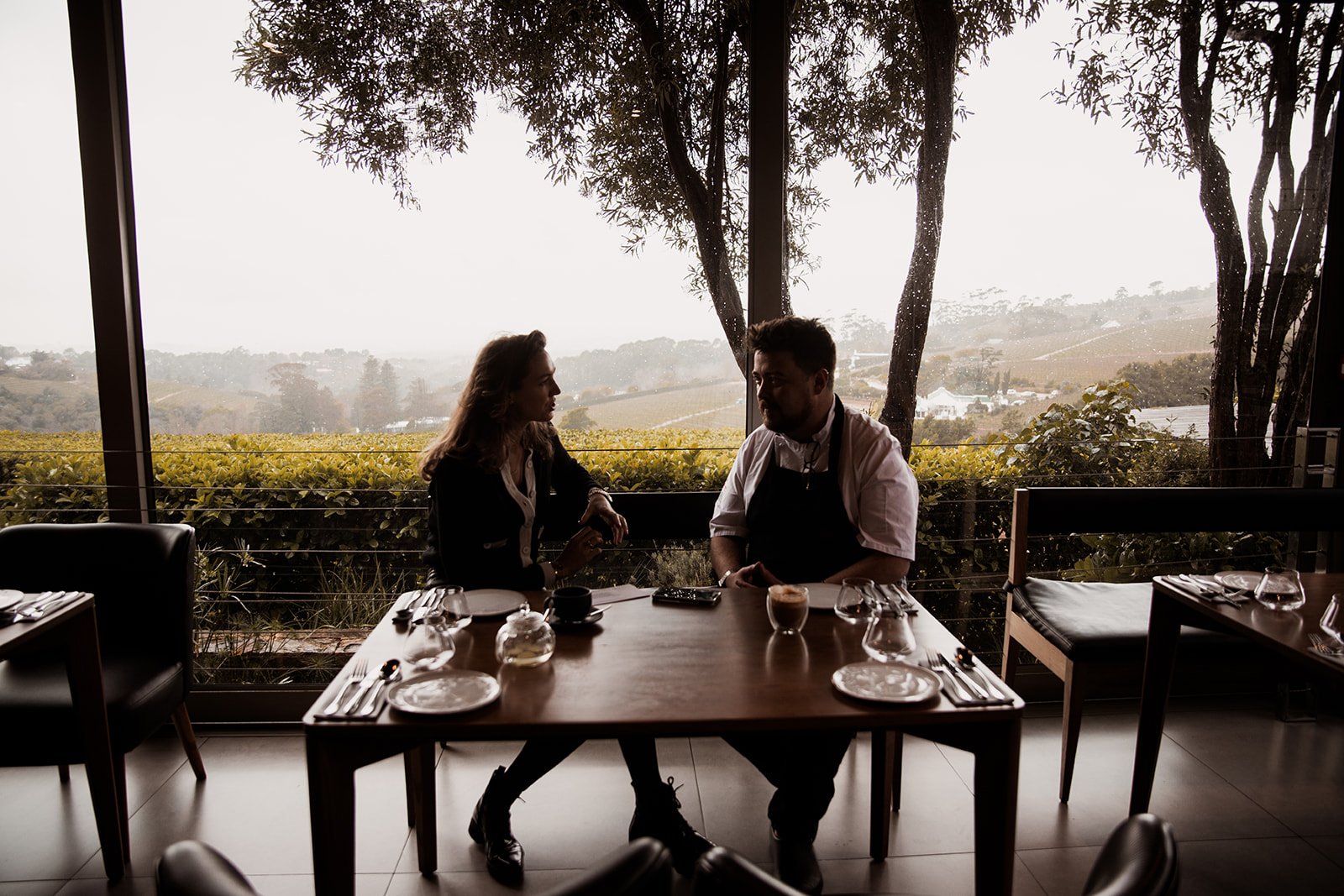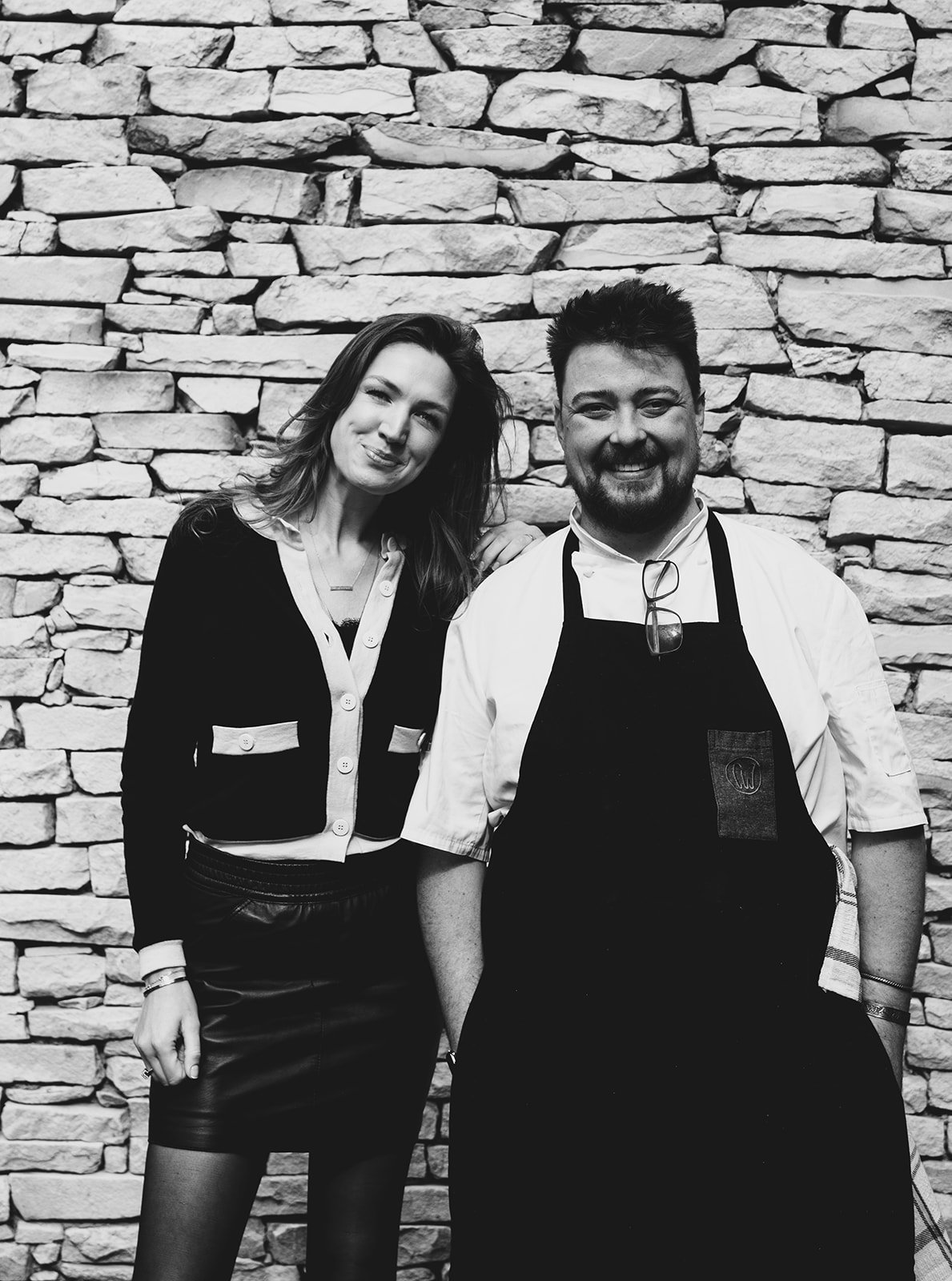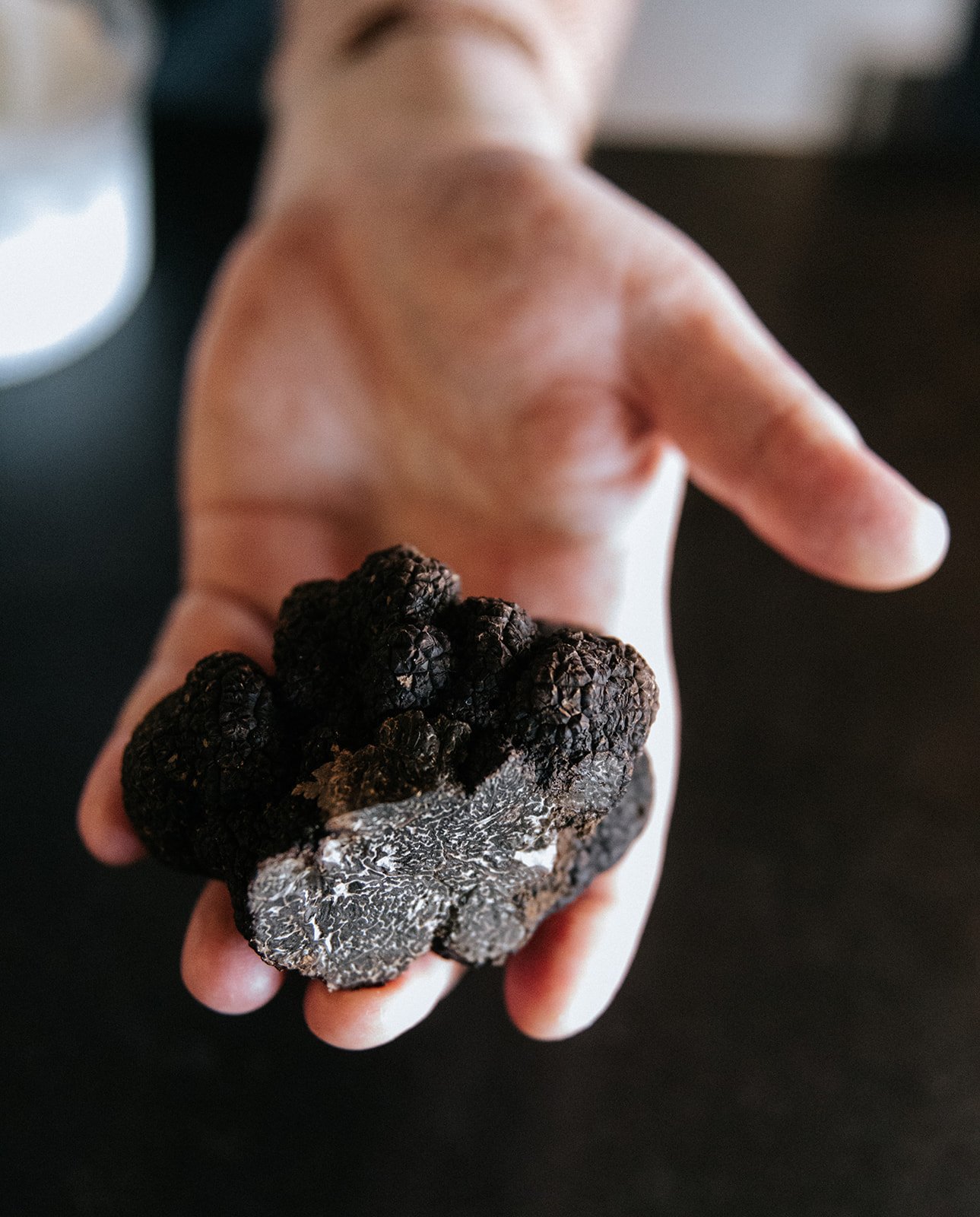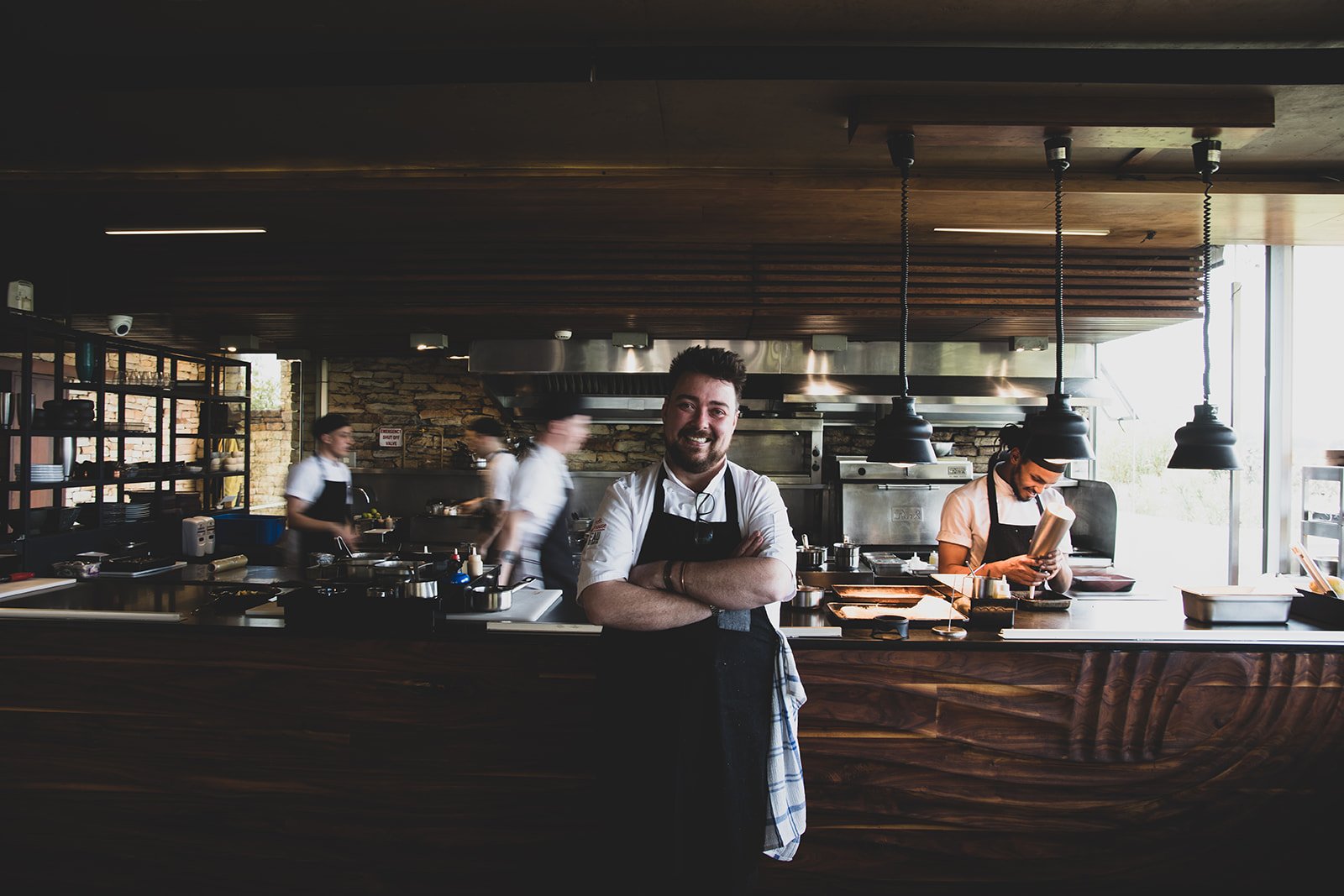Ivor Jones of Chefs Warehouse (Beau Constantia)
Ivor Jones is head chef of Chefs Warehouse at Beau Constantia wine estate – one of South Africa’s top-rated fine dining experiences. Peering over the vineyard’s rows from its hilltop perch, the restaurant surveys the Cape’s oldest wine valley, making dining here an all-around sensory harmony. But there’s just enough creative discord to keep it fresh and the food moving forward. No doubt about it, Chefs Warehouse is setting the tone for the Cape Town food scene, putting the Mother City on the map as a foodie destination. And Jones is the winsome creative conductor behind it all.
We kick off our Where Chefs Eat series here, as NOAH owner Sarina van Engelen picks his brain about inspiration, ingredients, food failures and heroes.
RAPID FIRE
What ingredients surprise or excited you most?
A curry leaf is one of my favourite ingredients. It's extremely versatile it can be used in a range of different dishes. When you fry it, it goes crispy – it’s incredible!
What's your favourite drunken food?
Easy: burger or pizza.
Any unusual sources of inspiration for dishes?
No, not really. I really just look at the season and what's good. I enjoy Southeast Asia cooking – that’s where I find most of my inspiration. And of course I like looking at what’s new.
Have you tried to replicate dishes from your mother’s cooking or use them as inspiration?
So, I have used it inspiration, as my mother is of course Dutch – all of the things my mother and Oma used to cook with really, like speculaas [a kind of spied shortbread cookie]. You will see that on the menu in my Jonesy Bar, the chocolate bar – it’s filled with speculaas. I love the whole Dutch side of cooking. So, yes, I do use it as inspiration.
What is your ultimate guilty food pleasure?
It’s probably a bit of foie gras. You don’t see it here in South Africa – you’ll only find it at some specialised delis that import it.
A plumber’s pipes are always leaking. On a scale of one to ten, how well do you cook for yourself?
Maybe a five. As chefs we are easy – we make a sandwich or something at home, or a nice pasta. Every day all day I’m concentrating so hard on people and food. When I get home, it's like, peanut butter sandwich or omelets or fried eggs – something simple.
Is there a cookbook that you love?
Yes. My favourite cookbook is Bar Tarteen. It’s an American restaurant and it's just an incredible use of the ingredients and preservation as well. Preserving pickles and jarring, and lots of different drying techniques. I used it a lot when I was beginning. It’s very inspirational.
WHERE CHEFS EAT
Anything from fast food to fine dining, what is your favourite restaurant and what do you order?
Salsify in Camps Bay – it’s one of my favourites for fine dining. Completely relaxed environment it's beautifully done up, and the food is really not overworked – really simple beautiful ingredients, done amazingly. My favourite dish at the moment they do is langoustine with truffle is stunning stunning, stunning, stunning, stunning.
And fast food?
Oh man, I love a good McDonald's. So bad – don't judge me!
Ha! No judgement.
There's a pizza place in Newlands called the Barruso’s and that, if I had to choose one place to go for pizza, would be my go-to place.
What are the top restaurants or chef’s foods in the world you would still like to sample?
I would really like to go to Copenhagen and try out a lot of the Nordic restaurants. Restaurant Noma and Geranium. Either are really incredible – they’re not your standard restaurant. It's a complete journey. Even though the food might be a bit wild, to understand the operation as an aspect of that would be amazing as well. They have massive teams of about 50 chefs, you know, and the front house teams are massive as well – how do they control it all? It’s like, crazy.
Some songwriters write the lyrics first, and then create a melody to go with the lyrics. Others come up with a melody, and then write the lyrics to fit. How do you go about planning a menu? Do you start with a central dish and then flesh out the theme around that, or do you start with a theme? Or is it an emotion or an experience that you wish to inspire in someone. What is the starting point?
So, essentially, it's all about an ingredient. We would like to ‘hero’ certain ingredients. Like this week South African asparagus is now in season, we are going to start to work on a new asparagus dish. It’s done when the season changes, so the dish changes. It really starts with your hero ingredient.
We’ve got an amazing lamb supplier who’s given us some lamb rumps. So we’re going to do a little lamb rump special for a couple of days. What's best is what’s available and we want our hero to be really, really good. At the moment, it’s citrus season, so we’re doing sashimi with a spicy Thai dressing. You start with the main ingredient and then the rest builds. For our main ingredients, we don't follow any sort of rules. Make your hero.
Where did your desire to become a chef begin? Where or how did you train as a chef? Did you have an apprenticeship?
Funny story. So, I trained as a chef at the South African Chefs Academy with Paul Hartmann. I didn’t know what I wanted to do out of school. I wasn’t really academically strong – my main subject was art and I was really good at drama. When I left school, I thought it would just be really cool to try cooking. I went to a cookery school for a year and loved it – loved the experience. I wasn’t really good when I started, but I loved it. In fact, I was pretty rubbish.
Then my first job was at the old La Colombe. At the time, it was the only real fine dining restaurant in Cape Town. I walked in there, and I had no clue what it was. I was like, ‘okay, I suppose I'm here now’? I worked there for four and a half years, and did a lot of learning. I was a junior chef for my first two to three years and worked my way up. It was under the ownership of Luke Dale Roberts; he was the head chef and owner of the restaurant. He had just started when I started, and it started to build a real name. There are still characteristics of his cooking in their current dishes, which is really interesting to see. He set a trend of bringing in Asian flavours in the French style. That’s where I found my love for cooking.
If you were not a chef, what would you be doing?
I would probably an artist or something. I love drawing – I love my art. So, it’s a hobby that I do outside of work as well. I am a creative person. That's why I do what I do, because it's creating with my hands. I'd probably be doing something art-wise or acting. It would've probably been a lot easier than being a chef, but I'm 16 years in now.
What ideas have you tested that have been complete failures?
I will tell you one story. When you have a langoustine dish on the menu, you collect all the shells and it takes about a month to collect enough shells to make a beautiful stock. So what we used to do is collect langoustine shells for a month and then make 100 litres langoustines shell stock. I was making it at night, and I burnt it completely! It was the worst thing ever – I burnt all the vegetables, I burnt everything. I was a junior shit, it was like my third year cooking, and it was a 100 litres of stock that you could not use. All the vegetables and everything were burnt to the bottom of the pan. It was probably the worst day of my life because the chefs really needed it, and I was the one who destroyed it.
Why do you think Cape Town has become such a massive destination for foodies?
It is an incredible city surrounded by amazing mountains, lots to do, lots of incredible wine farms. And then the food scene in Cape Town has grown in the last ten years to where everyone is competing and it is a really competitive space. Everyone is trying to be better and better and better and the food has gotten better and better and better. Cape Town has some amazing talent and they're all really trying to push a beautiful standard on food.
What about Michelin in Cape Town?
Do you see I've never worked with Michelin guide? I just don’t necessarily like the pressure of this and what it does to the teams. They start focusing on everything else but cooking. It will have its benefits, but its downsides as well.
We have that Eat Out awards, which is the Cape Town/South African version of the bigger food awards, an award show that’s been happening for tens years. They do a top ten list, but with Covid they haven't been around for awhile. They are coming back this year and they will travel around the country.
But, the fact is, these awards put you under pressure you become a bit blindsided. You start cooking for that award and you lose track off, like, just cooking for yourself and enjoying what you do. I don’t care about awards – I just want to cook good food.
When you think about sharing a meal with someone, do you see food or sharing meals together as an avenue for nurturing relationships? Put differently, do you see yourself as an architect of a theatre or stage, but not for actors, for relationships to form?
I mean, it's a big part of what we do. I think everything around food is sharing and bringing people together. It's why people like going to restaurants and grabbing a table – it’s forming a relationship. You know, a meeting over coffee does the same sort of thing, it forms relationships. I wouldn't say I'm an architect, but I do provide the groundwork.
Before we started this restaurant there was a Chefs Warehouse on Bree Street. It was a small little place, tiny, and everyone was really close together and it was all sharing. You couldn’t order your own dish. It was tapas for two. That concept was so cool. If you're quite a relaxed person, and if you like sharing food, that's like the best way to eat.
I really like family style, although we are moving a little bit away from a sharing style here. It's going more into individual plates and stuff. With our style restaurant and sort of the level and the clientele that are coming in, we find that forcing people to have eight dishes over four courses, often with dietary requirements, it’s a real struggling to do what we do properly. We have to make a lot of changes to cater for all dietary requirements. So now we've taken eight dishes and split them into four courses. And you can choose a dish from the course, or you can just order them all. Otherwise, it becomes an absolute nightmare with the dietary requirements.
Are there any ingredients specific to Cape Town or South Africa you use in your recipes?
Truffles from Khaya Lethu in Wakkerstroom, KwaZulu-Natal
At the moment, there is an incredible local truffle from KZN [Kwa-Zulu Natal, South African’s eastern-most province]. In fact, I started using them recently, and they are just coming out as good if not better in terms of flavour than the Italian truffle. That's really, really amazing this year.
What is your dream for your career?
That's a difficult question, man. What is my dream for my future career? Well, I'm 16 years in now and I'm very happy where it is now. I would like to look at opening other small restaurants.
For yourself or part of Chefs Warehouse?
We have an amazing family – everything we do, we do together. You know what I mean? But I would still like to do something for myself, my own brand. It would be amazing if it was still under the cover of our partners – it's an amazing relationship we’ve established.
We have always wanted to do something in Europe. We built this amazing group. We started six years ago. We have Maison Chefs Warehouse, Thali, Tintswalo, The Baileys now open as well. So it's really a group of amazing individuals that we all can learn from all the time, and our systems and operations have taken time to get where they are now. I have really learnt so much from this group.
It's an Incredible family of restaurants and chefs, we’ve got some really cool team members, and it's a real forward-moving and happy environment – a place you wanna go to. The amount of training we do is incredible. It’s always evolving and changing – that’s why I am still here, we’re still doing new things.
We opened a company called Essentials, where we create mini bar snacks for boutique hotels. It’s more bespoke, it’s more curated. We work closely with local chocolatiers, local fudge makers. All packages are biodegradable, and fully customizable.
Remember to check out the Wild Honey Lavender Crème recipe which he shared with us on our blog.
The photos in this interview were taken by Mink Jaeger.





